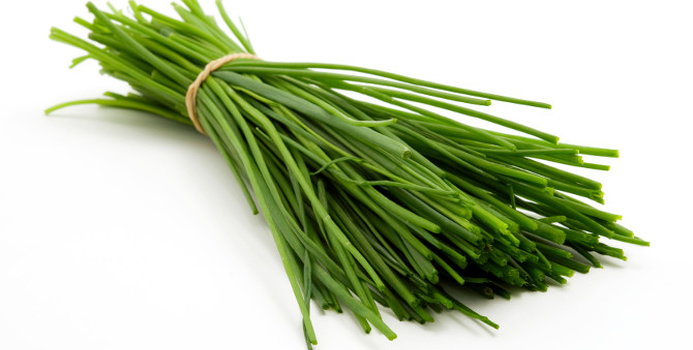Chives belong to the allium group or onion family. They give a nice, zesty flavor to food. The plant is the smallest member of the family. It has long, narrow leaves attached to a slender bulb. You can use chives to flavor soups, stews, sauces and salads. It can also be used as a garnish. Chives are an excellent salt substitute and a perfect aid for those on a low fat, salt restricted diet. It contains vitamins A, B6, C and K. Several minerals are found inc chives including calcium, copper, iron, magnesium, manganese, phosphorous, potassium, selenium and zinc. It is also a good source of folic acid and dietary fiber. The small, onion-like vegetable has several benefits to health.
Antibiotic
Like most plants in the allium group, chives have antibiotic properties. The natural antibacterial and antiviral agents in the vegetable work with vitamin C to destroy harmful microbes. This makes the plant an excellent natural defense against the common cold, flu and certain yeast infections.
Anti-Inflammatory
The plant has a mild anti-inflammatory effect. When included in your diet it can help reduce the risk of rheumatoid arthritis. The juice of the plant can be used as an insect repellent. When applied to wounds, it reduces fungal infections. The chive plant is rich in vitamin C which helps to prevent bruises and wounds. It also supports the immune system. Vitamin E in the plant has antioxidant properties which support the functions of the immune system. These vitamins also help to eradicate free radicals that can damage cells.
Anti-Carcinogenic
Chives are also used as a medicine. They help inhibit the growth of tumors and cancer. The small onions have been found helpful in the treatment of esophageal, stomach, prostrate and gastrointestinal tract cancers. Selenium in the small onion helps to protect cells from the effects of toxins and free radicals.
Circulatory
Flavonoids occur richly in this onion-like vegetable, helping to stabilize blood pressure and reduce hypertension. Sulfides in the plant help to lower blood lipids and blood pressure. Chives also contains substances that prevent blood clots. The high amounts of vitamin C in the plant help to improve the elasticity of blood capillaries. Folic acid helps to prevent constriction of blood vessels. This improves blood circulation. Vitamin C also facilitates absorption of iron in the body.
Cardiovascular
Regular intake of chives improves blood pressure. It also helps to reduce bad cholesterol levels. These beneficial effects on blood help to lower the risk of stroke and heart disease. The zesty vegetable helps to prevent calcification in arteries. Vitamin B6 reduces the levels of homcysteine in the blood. This is a product of cellular biochemical activity. High levels damage the walls of blood vessels. Selenium helps to prevent heart disease.
Digestion
Chives are an excellent source of dietary fiber. Plenty of roughage in the diet facilitates proper digestion. It contributes to intestinal health. This helps to prevent constipation and hemorrhoids. However, excessive consumption can unsettle the digestive system.



